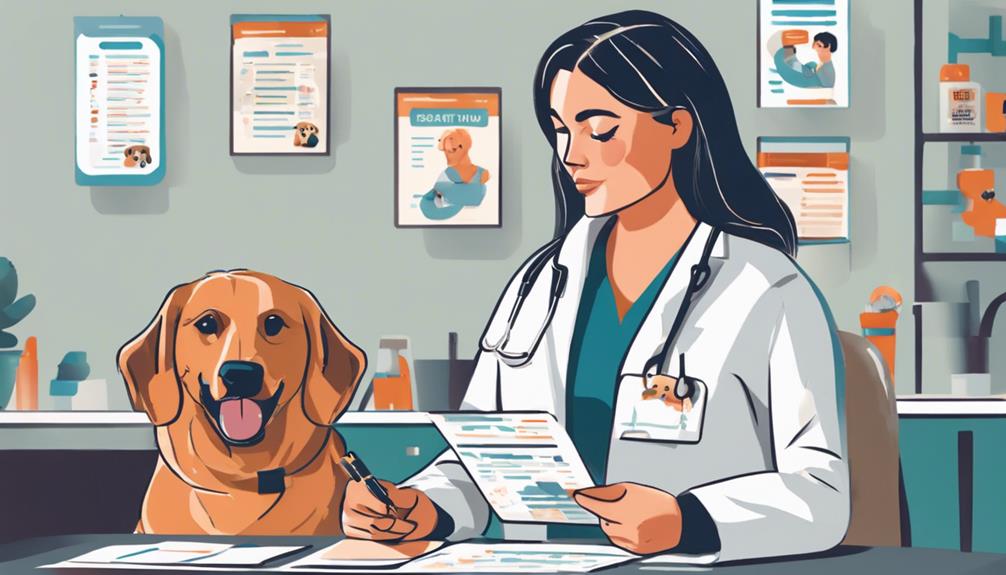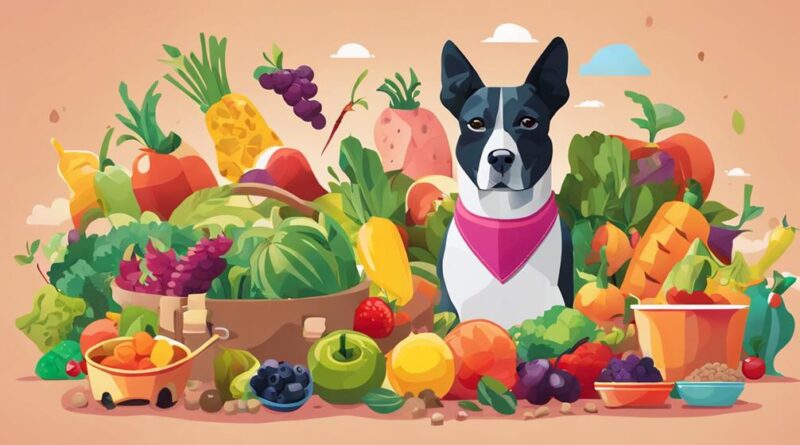What Are Essential Diet Tips for Healthier Dogs?
Imagine your dog's diet as the fuel that drives their overall health and well-being. Just like a car needs the right type of fuel to run smoothly, your furry companion requires a balanced and nutritious diet to thrive.
But with so much information out there, it can be overwhelming to decipher what truly constitutes a healthy diet for your canine friend. Let's break down essential diet tips that can make a significant difference in your dog's health and happiness.
Understanding Your Dog's Nutritional Needs
Understanding your dog's nutritional needs is crucial for ensuring their overall health and well-being. When it comes to protein requirements, dogs are omnivores, meaning they need a balanced diet that includes protein from sources like meat, fish, and eggs. Protein is essential for building and repairing tissues, supporting a healthy immune system, and maintaining proper growth and development in your furry friend.
In addition to protein, digestible carbohydrates play a significant role in your dog's diet. While dogs don't require carbohydrates for energy like humans do, they can still benefit from sources like whole grains, fruits, and vegetables. These digestible carbohydrates provide fiber, vitamins, and minerals that contribute to your dog's overall health and digestion.
Choosing High-Quality Dog Food
When selecting dog food for your furry companion, prioritize high-quality options rich in essential nutrients for their optimal health and well-being. Check the ingredient sourcing and nutritional content of the food to ensure it meets your dog's dietary requirements. Look for options with real meat as the first ingredient and avoid artificial additives or fillers.
Grain-free options can be beneficial for dogs with specific dietary sensitivities or allergies. Consider specialty diets tailored to your dog's unique needs, such as weight management or sensitive stomach formulas. These diets can help address specific health concerns and ensure your dog receives the necessary nutrients.
Always consult with your veterinarian to determine the best food choice for your dog based on their age, breed, and health status. Providing high-quality dog food is essential for promoting your furry friend's overall health and longevity.
Incorporating Fresh Fruits and Vegetables
To enhance your dog's diet with additional nutrients, consider incorporating fresh fruits and vegetables into their meals. Homemade meals can be a great way to ensure your dog is getting a variety of nutrients. Including fruits and vegetables in your dog's diet can provide essential vitamins, minerals, and antioxidants that promote overall health and well-being.
When preparing homemade meals for your dog, remember the importance of balance. Raw feeding is a popular choice for many dog owners incorporating fresh fruits and vegetables into their dog's diet. This method involves feeding raw, unprocessed foods like raw meats, fruits, and vegetables to mimic what a dog's ancestors may have eaten in the wild.
Before introducing new fruits and vegetables into your dog's diet, it's essential to research which ones are safe and beneficial for them. Some fruits and vegetables, like grapes and onions, can be toxic to dogs. Always consult with your veterinarian to ensure the foods you're incorporating are suitable for your dog's specific dietary needs.
Monitoring Portion Sizes
Consider adjusting your dog's portion sizes to ensure they're receiving the right amount of food for their size and activity level. Proper portion control is essential for maintaining your dog's ideal weight and overall health. Measuring meals can help you avoid overfeeding or underfeeding your furry friend.
Start by checking the feeding guidelines on your dog's food packaging. These guidelines typically provide a recommended amount based on your dog's weight. However, every dog is unique, so it's important to monitor your dog's body condition and adjust portion sizes accordingly. If your dog is gaining weight, you may need to decrease the portion size, while a decrease in weight may indicate a need for a larger portion.
Additionally, consider your dog's activity level when determining portion sizes. More active dogs may require larger portions to fuel their energy needs. On the other hand, less active dogs may need smaller portions to prevent weight gain. By being mindful of portion control and measuring meals, you can help your dog maintain a healthy weight and live a happier, healthier life.
Ensuring Adequate Hydration
Ensuring your dog stays adequately hydrated is essential for their overall health and well-being. Hydration is crucial as water helps regulate body temperature, aids in digestion, and supports nutrient absorption. Always provide clean, fresh water for your furry friend, and consider adding wet food to their diet for additional moisture. Water sources should be easily accessible throughout the day, especially after physical activity or during hot weather.
Signs of dehydration in dogs include dry gums, sunken eyes, lethargy, and loss of skin elasticity. To prevent dehydration, encourage your dog to drink water regularly and monitor their intake. During warmer months, increase water availability and limit strenuous exercise during the hottest parts of the day. If you suspect dehydration, consult your veterinarian immediately for proper evaluation and treatment. Remember, staying hydrated is key to keeping your dog healthy and happy.
Limiting Treats and Table Scraps
Keep your dog healthy by limiting the amount of treats and table scraps they consume. While it's tempting to indulge your furry friend with tasty morsels, excessive treats can lead to weight gain and nutritional imbalances. Instead of relying solely on treats, consider using treat alternatives like pieces of carrot, apple slices, or frozen peas. These healthier options can still be rewarding for your dog without the added calories.
In addition to treat alternatives, you can also use training rewards to reinforce good behavior. By incorporating your dog's regular kibble into training sessions, you can promote healthy eating habits while still providing positive reinforcement. This not only helps with behavior modification but also ensures that your dog maintains a healthy weight.
Limiting treats and table scraps is crucial for weight management and overall well-being. Consult with your veterinarian to determine the appropriate amount of treats for your dog based on their age, size, and activity level. By being mindful of treat consumption, you can help your dog lead a healthier and happier life.
Consulting With a Veterinarian

Wondering how to ensure your dog's diet is optimal for their health and well-being? Consulting with a veterinarian is crucial in ensuring that your furry friend is getting the right nutrition. Veterinarians can provide tailored advice based on your dog's specific needs, considering factors like age, breed, activity level, and any existing health conditions. If you're considering adding nutritional supplements to your dog's diet, a vet can guide you on which ones are safe and beneficial for your pet.
Moreover, if your dog has allergies and intolerances, a veterinarian can help identify the specific triggers and recommend suitable dietary adjustments. They may suggest hypoallergenic or limited ingredient diets to manage your dog's sensitivities effectively. By collaborating with a vet, you can address any concerns regarding your dog's diet and ensure they're receiving a balanced and nutritious meal plan tailored to their individual requirements.
Adjusting Diet for Health Conditions
To address any health conditions your dog may have, adjusting their diet accordingly is essential for their overall well-being and quality of life. If your dog has specific health issues such as arthritis or digestive problems, incorporating dietary supplements can be beneficial. Omega-3 fatty acids, glucosamine, and probiotics are examples of supplements that can help manage these conditions and improve your dog's health.
Furthermore, if your dog has allergies and sensitivities, it's crucial to identify and eliminate any triggering ingredients from their diet. Common allergens for dogs include wheat, soy, corn, and certain proteins like beef or chicken. Switching to a limited ingredient diet or hypoallergenic food can help alleviate allergic reactions and improve your dog's overall health and comfort.
Consulting with your veterinarian to determine the most suitable dietary plan for your dog's specific health condition is highly recommended. They can provide tailored recommendations based on your dog's individual needs, ensuring they receive the best possible nutrition to support their health and well-being.
Frequently Asked Questions
Can I Feed My Dog a Vegetarian or Vegan Diet?
You should carefully consider whether to feed your dog a vegetarian or vegan diet. Nutritional balance is crucial for your pet's health, so consult a vet to ensure all their dietary needs are met.
Ethical considerations are important too, as dogs are naturally omnivores. Be cautious and make informed decisions to provide the best diet for your furry friend's well-being.
How Often Should I Switch up My Dog's Food to Prevent Food Allergies?
To prevent food allergies in your dog, consider rotating their food regularly. Food rotation involves switching up the types of food your dog eats, which can help prevent them from developing allergies to specific ingredients.
Are There Any Specific Supplements I Should Add to My Dog's Diet for Optimal Health?
To keep your pup healthy, consider adding Omega supplements and Probiotic treats to their diet. These supplements can support your dog's overall well-being by promoting a healthy coat, skin, and digestion.
They're great additions to ensure your furry friend gets the nutrients they need for optimal health. Remember, always consult with your vet before introducing any new supplements to your dog's diet.
Can I Give My Dog Raw Meat as Part of Their Diet?
You can give your dog raw meat as part of their diet, but it's essential to consider raw meat safety. Make sure to source high-quality, fresh meat to minimize the risk of bacterial contamination.
Raw meat can provide nutritional benefits like natural enzymes and proteins that are sometimes lost during cooking. Remember to consult your vet for advice tailored to your dog's specific dietary needs before incorporating raw meat into their meals.
How Can I Tell if My Dog Is Overweight and Needs to Adjust Their Portion Sizes?
To check if your dog needs dietary adjustments, focus on weight management and portion control. Watch for signs like a lack of a defined waist or feeling ribs with difficulty.
If your dog seems overweight, reduce portion sizes gradually. Consult your vet for guidance on adjusting their diet to a healthier balance.
Body condition scoring can help you assess if your pup needs dietary changes to maintain a healthy weight and overall well-being.
Conclusion
In conclusion, by understanding your dog's nutritional needs, choosing high-quality food, incorporating fresh fruits and vegetables, monitoring portion sizes, ensuring adequate hydration, limiting treats and table scraps, consulting with a veterinarian, and adjusting their diet for health conditions, you can help keep your furry friend healthy and happy.
Remember, a balanced diet is essential for your dog's overall well-being, so make sure to prioritize their nutrition for a long and fulfilling life.
